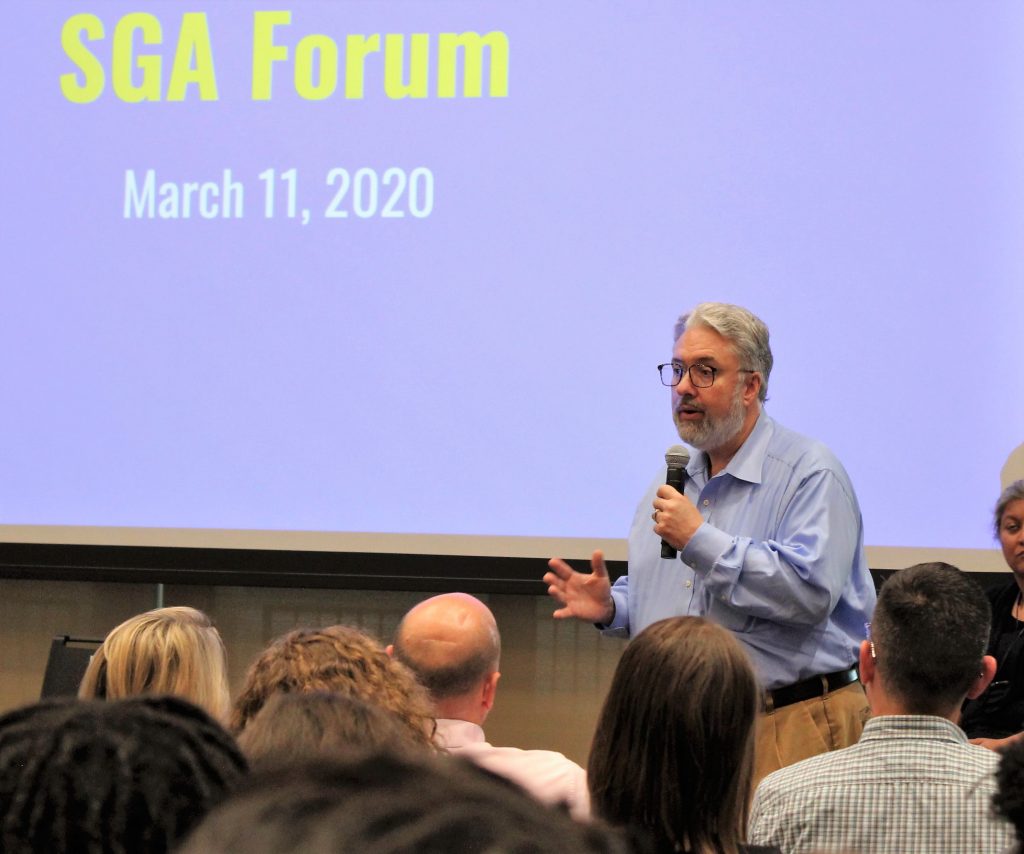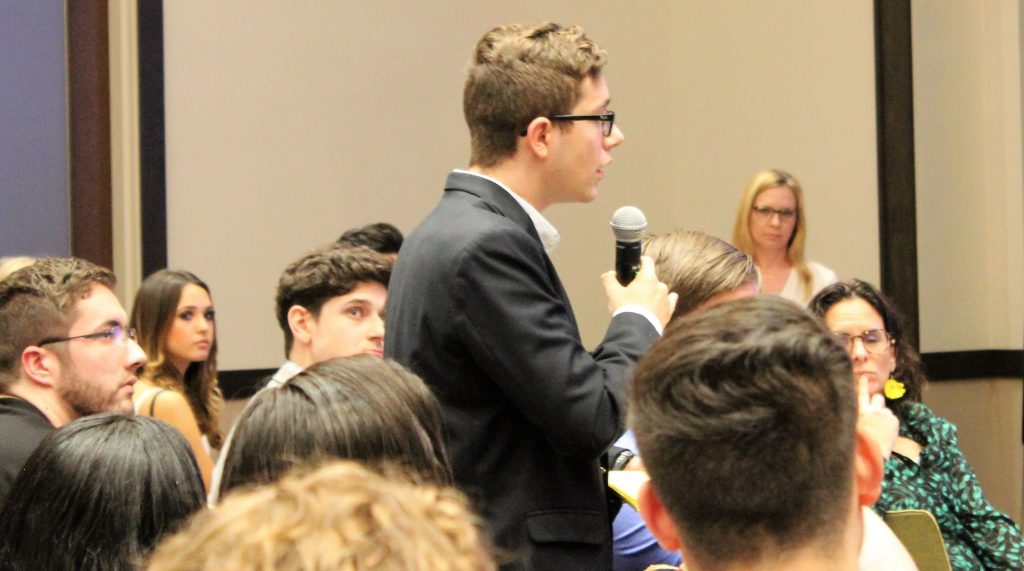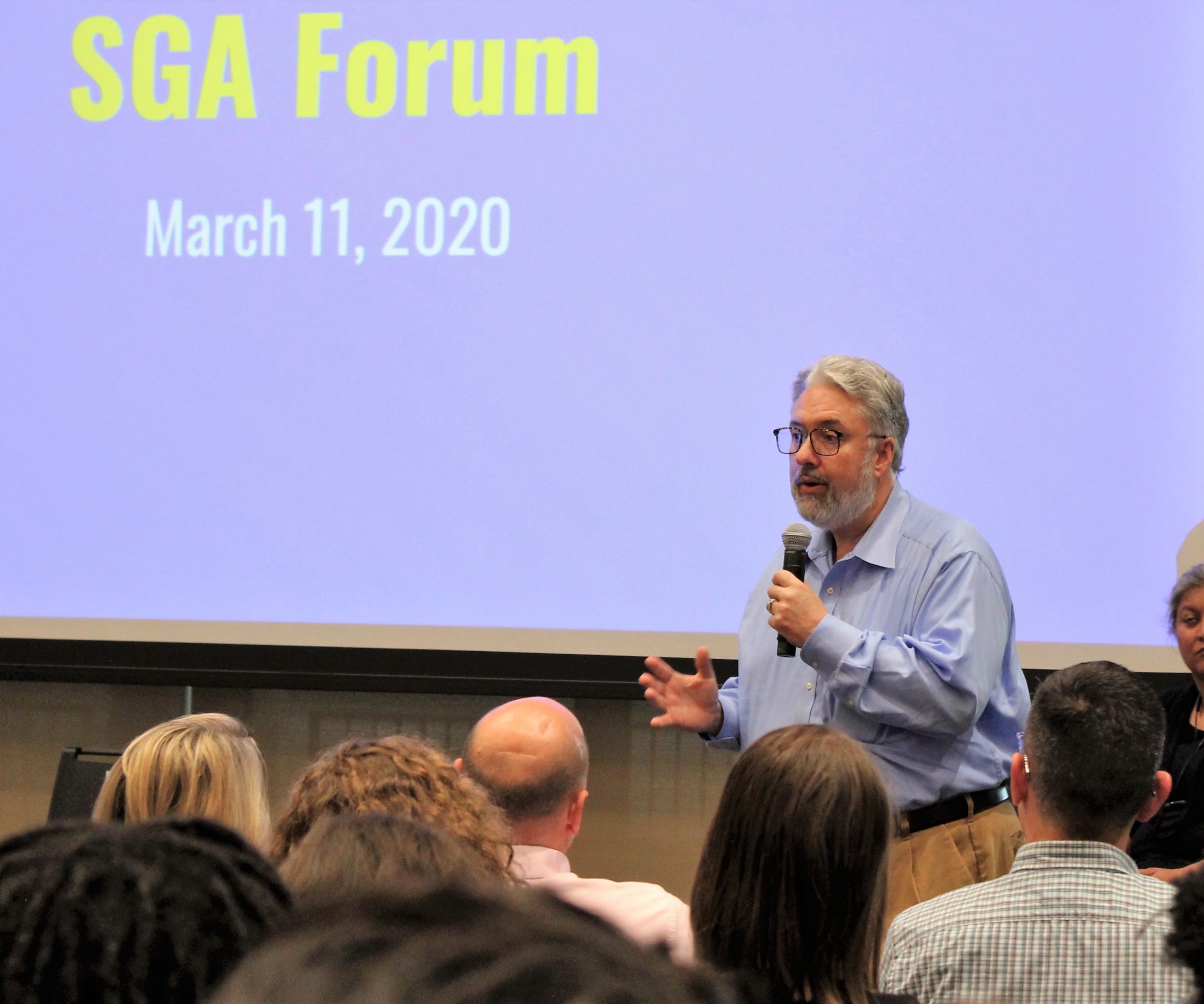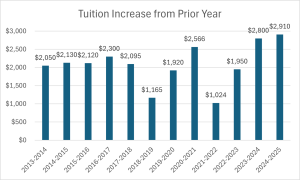
Ed Kania, vice president for Business and Finance and Treasurer, tells students to expect tuition increases every year.
The first and last SGA town hall meeting of the semester was held one day before the announcement that Spring 2020 will continue virtually. The meeting engaged students and faculty in a productive dialogue about a tuition increase, new mandatory dining plans, and COVID-19 developments.
The forum was arranged by SGA in order to foster transparency between Rollins and its students—well before the coronavirus seemed like a pressing concern. As student-run social media accounts and petitions gained campus-wide attention, the town hall meeting focused on addressing student concerns.
Tuition Increase
In February, it was announced that tuition for the 2020-2021 school year will increase by $2,016, not including fees for room and board.
Students’ FAFSAs will increase in relation to the increase of tuition. Rollins scholarships, however, will remain the same as the offer given at the time of enrollment, regardless of increasing tuition.
“Tuition increases because costs associated with the college increase,” said Ed Kania, vice president for Business and Finance and Treasurer. He said that the college’s climbing expenses relate to rising utility costs and professor salaries.
When asked if students should expect their tuition to increase every year, Kania said yes. Every year, the costs to run the school get more expensive as utilities, salaries, and overall school costs rise, he said. He also said the increased tuition does not pay for the construction of new buildings.
Dr. Mamta Accapadi, vice president for Student Affairs, explained that although current scholarships will not increase, more may be created for the incoming students to offset their initial cost.
“When we have cost increases, a portion of that cost increase includes a set of resources to be able to provide need-based resources to students who need it,” said Accapadi.
Many students present demanded increased transparency for students currently applying to Rollins, saying that they should be aware that their tuition will most likely increase.
To respond to the increased tuition, SGA has passed a bill pushing for financial transparency. The Fair Tuition Act, voted on March 4, requests access to all meetings held between the Board of Trustees and the Department of Finance.
The townhall was heavily advertised on the student-run Instagram account @rolly_tuition, which now has over 300 followers, connecting students who are concerned about Rollins’ rising tuition. Students at the town hall meeting voiced their experiences with having difficulty accessing certain financial information and understanding how much they were required to pay Rollins.
Regarding transparency, President Grant Cornwell answered, “The budget is open to you. There is nothing secret or even private … It’s not easy, but if you’re interested, we will arrange for you to really have access to it.”

Many of the questions students asked involved increased financial transparency from Rollins.
Mandatory Housing-Dining Costs
In addition to the tuition increase, off-campus students and those living in Sutton Place Apartments and the Lakeside Residential Complex will be required to buy one of the dining plans. Off-campus students will be required to buy a minimum meal plan of $250 per year.
“It’s only one meal a week, but we think it will help build a community,” said Kania, who was a commuter student when he was in college. The required meal is meant to allow commuter students a chance to eat with other Rollins students and feel fully immersed in the community.
Meanwhile, students living in Sutton and Lakeside apartments will be required to buy their choice of a meal plan with the least expensive options costing $3,900 per year, even though they have full kitchens in their apartments.
The lowest-priced meal plan options for these students are only partial meal plans, and a student’s nutritional needs may also require additional groceries.
Kania said the increased expense of the dining plan is offset by a decrease in the cost of living in Sutton next year. “The plan is going to cost $3,900 dollars, but that cost per year is actually $80 a week, or $2,650 per year, because what we’ve done is reduced the price of double apartments in Sutton,” said Kania.
When adjusted for lower-priced housing, the meal plan costs roughly $50 a week, which Kania said was also at or below the average amount college students spend on groceries per week.
The U.S. Department of Agriculture reports that an individual spending money liberally on food spends under $80 per week, and a person on a “thrifty plan” spends approximately $40 a week.
“The meal plan that we would be required to buy isn’t a full meal plan, so we would be required to buy groceries on top of that,” said Mary Vickers (‘20).
Ellie Heller (‘21) added, “Everyone I know spends $25 dollars or less on groceries without a meal plan.”
Coronavirus Acknowledgement
The town hall meeting ended with a discussion regarding the coronavirus.
School officials announced that while there were plans to reimburse some of students’ room and board costs, tuition would not be reimbursed. Kania sent an email last Tuesday listing options to either reimburse students for their room and board or provide financial credit for their outstanding balances. If a student chooses to have the funds reimbursed, they must fill out a request form. All accounts will be reimbursed by March 31.
“I would encourage administration to look at a possible tuition refund because I know one thing Rollins really prides itself on is the fact that we don’t have virtual classes,” said Omar Sadek (‘23).
However, faculty responded that tuition is allocated, in part, to professor salaries, and as professors are still working and being paid, tuition needs to be paid as well.
Faculty & Staff Response
After hearing student concerns, some faculty members and administration shared what they had taken away from the evening.
“I want to apologize that you didn’t feel heard before or that you weren’t heard before,” said Dean of Students Megan Harte Weyant. “We want to hear you. We want to understand your experience, and then we need to go back and think about that and think about how we can be a part of that solution.”
Cornwell said he is currently writing a review of the concerns raised in the meeting and he will release a response in the future.
“We simply have to be better at transparency and communication. We have fallen short of what you deserve and we will get better,” Cornwell said. “We will convene on the issues we have heard today. I can’t tell you right now what responses are going to be, but we will issue a formal response. […] Even if they are answers you are not going to like, we will give you answers.”















[…] of some sort has occurred each year since 2015. This year, tuition increases are occurring after a $2,016 increase for the 2020-2021 school year and a prior increase of $1,940 in […]
[…] (SGA) organized a town hall meeting on Feb. 9 to address concerns of on-campus living conditions. The last SGA town hall meeting was held nearly two years ago, when students and staff discussed increasing tuition and housing […]